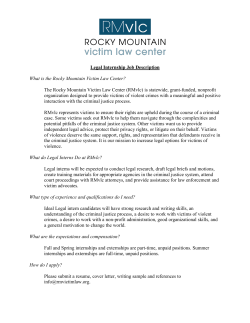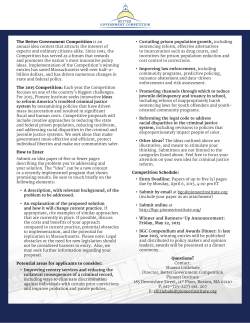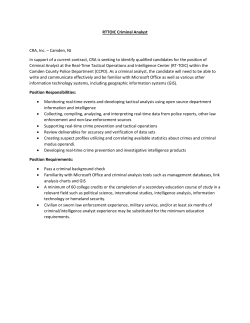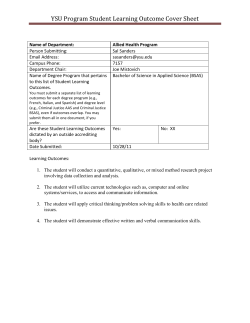
CCJ 310/PARL 315 INTRODUCTION TO CRIMINAL LAW Spring
CCJ 310/PARL 315 INTRODUCTION TO CRIMINAL LAW Spring 2015 Day: Time: Location: Wednesdays 6:00-8:30 p.m. Faner Hall 1326 Instructor: Office Hours: E-mail: Angela Rollins, J.D. By Appointment Only (call 618-713-7298 to set up time) areaney@siu.edu COURSE DESCRIPTION AND OBJECTIVES: This course provides a general understanding of common criminal law concepts. The objectives of the course are to familiarize you with the general principles that apply to all criminal offenses, and the specific elements of particular crimes that prosecutors must prove beyond a reasonable doubt. Students will learn to apply criminal law basics to real-life situations. Consistent with the course objectives, this course focuses on the concepts of actus reus, mens rea, concurrence, causation, and harmful result; the defenses of justification and excuse; the doctrines of complicity and inchoate (unfinished) crimes; and the elements of the major crimes against persons, property, and habitation. By the end of the course, each student should understand the following principles: 1. We punish people for what they do, not for what they intend to do or for who they are; only voluntary conduct is punishable. 2. Serious crimes require not only a criminal act, but a blameworthy state of mind—either purpose, knowledge, recklessness, or negligence. 3. Justifications free defendants from punishment because they prove the defendants aren’t blameworthy; excuses free them because they prove the defendants aren’t responsible. 4. Complicity makes one liable for the acts of another because of one’s own participation; vicarious liability makes one liable for the acts of another because of one’s relationship. 5. Inchoate offenses are separate crimes for trying to commit a crime (attempt), agreeing to commit a crime (conspiracy), or trying to get someone else to commit a crime (solicitation). COURSE TEXTBOOK: Samaha, J. (2011). Criminal Law (10th Edition). Belmont, CA: Cengage Advantage Books. COURSE REQUIREMENTS: The following tasks constitute course requirements. Except in unexpected, rare, emergency circumstances—e.g., serious illness, death in the family, or car accident—there are no make-ups. A request for a make-up on account of an emergency must be e-mailed to me within two school days after the missed requirement. Tests: (60% of your grade): There are two tests worth 300 points each. Each test may consist of multiple choice, true/false, and short answer questions. The dates for these tests are listed in the course schedule Final Exam (30 % of your grade): The final exam may consist of multiple choice, true/false, short answer and essay questions (300 points total). The date/time of the final is listed in the course schedule below. Case Brief & Class Presentation (10% of your grade): Each student will be assigned at least one case from the textbook. The student will be required to complete a one-page case brief and present the case in class. COURSE GRADES: Letter grades will be assigned using the following grade scale: A B C D F 900 - 1000 points 800 - 899 points 700 - 799 points 600 - 699 points fewer than 600 points ATTENDANCE: I will pass an attendance sheet at the beginning of every class. It is your responsibility to sign the attendance sheet. If you leave class early I may remove your name from the attendance sheet. Any student that misses more than two classes will be subject to a whole letter grade reduction. COURSE POLICIES: Students shall comply with the Student Conduct Code. Incidents of plagiarism or other forms of academic dishonesty may result in an F for the assignment, an F for the course, and/or a report to the Dean of the College of Liberal Arts. To get the most out of the course, and to earn a better grade, you are encouraged to: Attend class regularly. Read the assignments before coming to class. Take careful notes in class and over the readings, and review them regularly. Ask questions. COURSE SCHEDULE: The schedule on the following pages indicates what we will be doing, and when we will be doing it. All topics and dates are tentative and subject to change. Any changes will be announced in class in advance. Date Week 1 Jan. 21 Week 2 Jan. 28 Week 3 Feb. 4 Week 4 Feb. 11 Week 5 Feb. 18 Week 6 Feb. 25 Discussion Topics Syllabus, Course Overview, Introduction Criminal Law and Criminal Punishment: Overview Constitutional Limits on Criminal Law Actus Reus Reading Assignments Mens Rea, Concurrence, Causation, and Ignorance and Mistake EXAM: Chapters 1 – 4 VIDEO Chapter 4 2 Chapter 1 Chapter 2 Chapter 3 Week 7 Mar. 4 Week 8 Mar. 18 Week 9 Mar. 25 Week 10 Apr. 1 Week 11 Apr. 8 Week 12 Apr. 15 Week 13 Apr. 22 Week 14 Apr. 29 Week 15 May 6 Defense: Justification Chapter 5 SPRING BREAK Mar. 7 -15 Defense: Excuse Chapter 6 Parties to Crime and Vicarious Liability Inchoate Crimes: Attempt, Conspiracy, and Solicitation EXAM: Chapters 5 – 8 VIDEO Crimes Against Persons: Murder and Manslaughter Chapter 7 Crimes Against Person: Criminal Sexual Conduct, Bodily Injury, and Personal Restraint Crimes Against Property Chapter 10 Crimes Against Public Order and Morals Chapter 12 FINAL EXAM – Chapters 9 – 13 Wednesday, May 13, 2015 5:00 – 7:00 p.m. 2 3 Chapter 8 Chapter 9 Chapter 11
© Copyright 2025





















